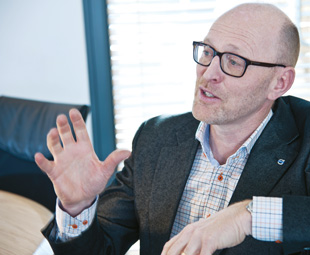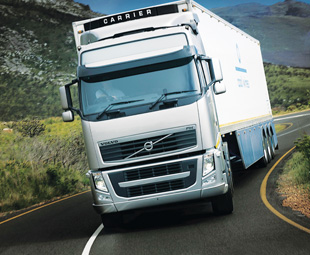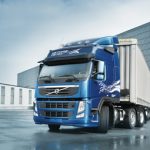The more things change …

Volvo Trucks has proudly announced that Torbjörn Christensson is its new group president for southern Africa.
GAVIN MYERS spent some time getting to know this enthusiastic man
Some people cope with change better than others. Others thrive on it. Torbjörn Christensson, the Volvo Group’s new president for the southern African region, is one of the latter.
Christensson comes to South Africa from Denmark, where he served as Volvo Denmark MD since 2009. Prior to that, he was service director and then commercial aftermarket director in Europe, responsible for all issues related to technical support and spare parts. Christensson has actually enjoyed two stints with the Volvo Group – he started his career at Volvo Aero, spending three years as a trainee in product manufacturing, engineering and planning.
He then spent 17 years with SAAB Automobiles in various positions, including service manager, aftermarket director and chief engineer. His years in aftermarket activity for both passenger and commercial vehicles resulted in experience that Christensson uses to his advantage: “You realise that if you release a product that’s not finished onto the market, you then have to do a lot of cleaning up on what was initially incorrectly designed and tested.”
Christensson is a qualified mechanical engineer, then studied economics and complemented it all with management training. “I’m very technically-minded but also interested in the business side,” he says.
In his new role, Christensson will head up the group’s southern African regional function. He explains: “We have appointed managing directors for each brand within the group – Mark Erasmus for Volvo, David Rouger for Renault and Jacques Carelse for UD Trucks – who are responsible for driving their respective brands. They control all the sales people, all the aftermarket people, and so on. But some of their other functions will report to me, such as human resources, accounts and areas that are not customer-dependant. I’m not Mr Volvo, Mr Renault or Mr UD; my role is to take the group perspective.”
On the topic of the various brands in the Volvo group, Christensson notes the changes in today’s climate necessitate a different approach if one is to remain competitive: “You need to have economies of scale in this business because of the expense of platform and engine development. For Volvo, it’s definitely the way forward.
 “The brands are separated sales-wise, but there is a lot of collaboration in development. Despite being competitors in the market, wherever we can contribute to greater cost-efficiencies, and thus greater competitiveness, we support each other,” he says, noting that it’s a delicate balancing act. “You have to be very careful how you orchestrate things; we have no intention of destroying any of our brands. You have to really know what you’re doing!”
“The brands are separated sales-wise, but there is a lot of collaboration in development. Despite being competitors in the market, wherever we can contribute to greater cost-efficiencies, and thus greater competitiveness, we support each other,” he says, noting that it’s a delicate balancing act. “You have to be very careful how you orchestrate things; we have no intention of destroying any of our brands. You have to really know what you’re doing!”
So how does he plan to take Volvo, and the group as a whole, to greater heights in a region where 18 individual countries fall under his responsibility? “Unlike Europe, where things are more established, this region is forecast for a lot of growth,” he says. “This is a very dynamic, growing region. If everything goes right, there’s a lot to be developed here and in the other countries around us.
“Volvo itself has taken market share, but the three brands have all been successful in being part of the growth and taking some market share – a lot of the planned growth we see from the brands is in the surrounding countries. For development, you need trucks; Volvo wants to be in early with a service network and the possibility to sell trucks.
“I think the region will see big double-digit growth figures, which you won’t see in many other places,” he adds enthusiastically.
While growth for the region is on the cards for the next few years, the local front has already experienced quite a bit of growth in recent years. Christensson’s efforts in South Africa will therefore centre on coping with the volume and providing professional service – his years handling these aspects for Volvo and SAAB underlying their importance for him.
“We are here to sell trucks, but the only way to sell trucks is to be extremely good in terms of service,” says. “We want to be the best partner for our customers in service. “Service, service, service! If you don’t have that, you might sell one or two trucks, but you’re not going to be successful in the long-term.
“Whatever happens, we need to be there for our clients. We’re not just selling hardware, just trucks; we’re selling complete solutions, including a long-term relationship. We need to build our network and follow our customers throughout the region – South African transporters are very successful at that – so we need to follow their needs and be where they go,” he emphasises.
I ask Christensson – who has only been in South Africa since April 15 – about his impressions of the local operators he’s met so far. “It’s wrong to think that there’s a big difference between Europe and SA,” he says. “South African operators run very professional transport companies and have total control over their fleets. They have very good operations. I think things are very well developed in that regard. At the end of the day, they also buy trucks and transport things professionally – there are more similarities than differences, no single thing has struck me as a big difference.
“What is different is the distances South African transporters have to travel,” he adds, contrasting the density of Europe with the sparse distances locally. “In Europe, a manufacturer has to have workshops half an hour or an hour away to be competitive,” he exclaims, noting that in Europe Volvo has 1 100 dealers selling and servicing trucks. “The distance difference affects how everybody operates. What the truck operators have to handle here in terms of distance, and what they have to plan for, has struck me. These things aren’t even thought about in Europe. But those are geographical differences – I’ve been visiting some of our customers and I find them extremely professional; very similar to their European counterparts.”
It’s changes like these that make Christensson excited about his new appointment. “We have all three brands, which are very important for us to explore, and want to do our best for our customers in South Africa. Volvo has made steady investments in new markets and new truck development. All three brands have a very interesting future in this region, and I look forward to being part of it and helping to ensure that we continue to be the best partner for our customers.”
Published by
Focus on Transport
focusmagsa



 Big news from FOCUS on Transport + Logist
Big news from FOCUS on Transport + Logist


 !
Starting 1 April, every
!
Starting 1 April, every


 FUSO: Driving the Future of Mobile Healthc
FUSO: Driving the Future of Mobile Healthc



 A brand
A brand




 Wondering about the maximum legal load for a
Wondering about the maximum legal load for a 
 The MAN hTGX powered by a hydrogen combus
The MAN hTGX powered by a hydrogen combus

 Exciting News for South African Operators
Exciting News for South African Operators


